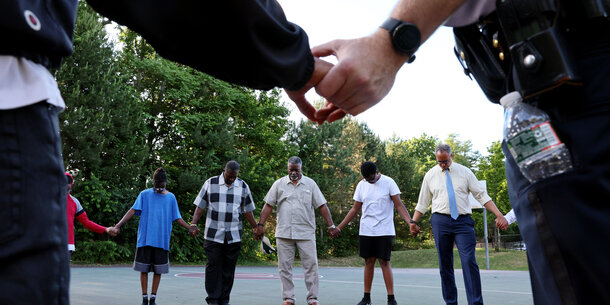This originally appeared in New York Daily News.
This year’s state budget forces lawmakers to confront a multi-billion-dollar deficit caused by the pandemic, and the needs of people impacted by this crisis. As lawmakers set priorities, they must take criminal justice into account, where key policy changes could improve the financial stability of millions of New Yorkers.
Parole reform — to reduce unnecessary reincarcerations and shorten excessively long prison sentences — could contribute to New York’s long-term financial health, cut correctional expenses, and, most importantly, change lives. It must be part of any final compromise on the budget, or a priority in the post-budget session.
Economic stability is most fragile in the months immediately following a person’s release from prison. Parole exacerbates this problem rather than ameliorating it by needlessly returning thousands to prison every year for petty non-criminal violations of release conditions.
Take Jamal (not his real name), a Syracuse man affiliated with Unchained, one of the organizations leading the campaign to pass the Less is More Act, which would dramatically reduce the number of people returned to prison for technical violations and allow people to earn early discharge from parole. According to Jamal, last February, he had completed 22 months of his 30-month parole term without incident. It was not easy for him to find a job to support himself, his fiancée and his three children.
But even when he found one, his parole officer scheduled a meeting that conflicted with Jamal’s work schedule, forcing him to choose: work, or parole. He chose work, and for that was sent back to prison — just as the coronavirus swept the state. Jamal’s fiancée was forced to move, Jamal was stuck in prison during a deadly pandemic, and his 22 months of progress were erased.
People reincarcerated for non-criminal technical parole violations like him make up a staggering 40% of new admissions to state prison every year, and the racial disparities are stark. Black people are returned to prison for technical violations at five times the rate of whites, and Latinos are 30% more likely than whites to be reincarcerated for technical violations. This is especially troubling in the context of the pandemic.
New research underscores the link between criminal justice involvement and financial stability. According to a recent Brennan Center report, nationally, people convicted of even minor offenses earn 16% less each year than people who are otherwise similar to them. Worse, time in prison cuts annual earnings in half, translating to about half a million dollars over a lifetime, often trapping people in poverty.
New York is not immune to these challenges. In a new report, the Brennan Center found that more than 330,000 living New Yorkers have been to prison at some point. Nearly three-quarters of them are Black or Latino, despite accounting for a little more than 30% of the state population. And the consequences are dire: Collectively, these New Yorkers’ annual earnings are nearly $1.9 billion less than those who are otherwise socioeconomically similar. This money could mean the difference between poverty and stability for many, and in the aggregate translates to a weaker economy and tax base.
Our criminal justice policies also impose unnecessary expenses on state taxpayers. Every year, New York spends roughly $6 billion on prisons and jails. The reincarceration of people for non-criminal technical violations of parole alone — like Jamal — costs the state hundreds of millions of dollars a year. That’s before factoring in the costs to families and communities.
State leaders should respond by prioritizing parole reform. The Less is More Act is supported by a broad, bipartisan coalition and will drastically reduce jail and prison costs. The Fair and Timely Parole Act would make parole release presumptive, leading to more people being granted release, sooner.
However, with 60% of our state prison population now serving determinate sentences, meaning they have a fixed release date and do not go to the parole board for a release decision, we must look beyond parole reform to sentencing reform. We should also make it easier for people like Jamal to find good jobs after returning home. A clean slate law sealing the records of people who have completed their sentence and avoided new convictions could achieve that goal by helping people escape the stigma of a criminal record.
New York can take a major step toward comprehensive criminal justice reform by including the Less is More Act in the state budget. Creating a more effective parole system — and helping people rebuild their lives after release from prison — will help build a stronger future for the state, now and for years to come.
Grawert is senior counsel in the Justice Program at the Brennan Center for Justice and a former assistant district attorney. Singletary is co-founder and co-executive director of Unchained and is currently incarcerated in the New York State prison system.



